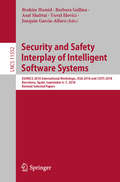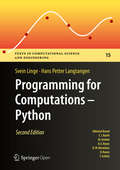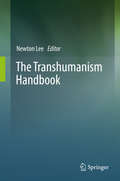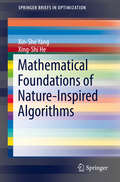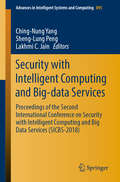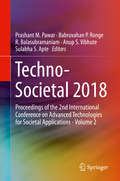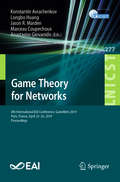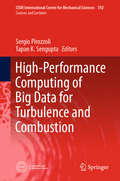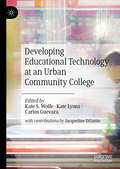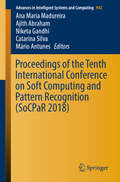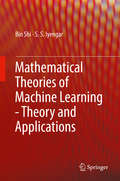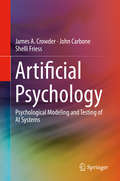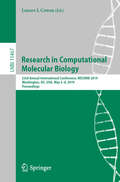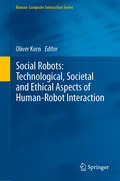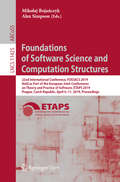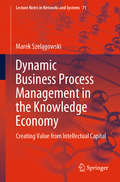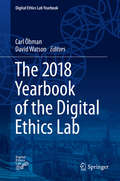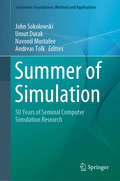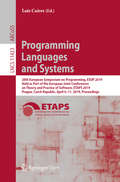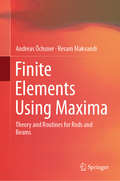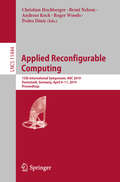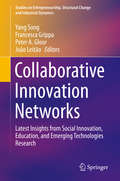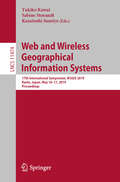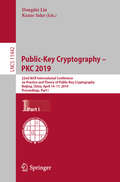- Table View
- List View
Security and Safety Interplay of Intelligent Software Systems: ESORICS 2018 International Workshops, ISSA 2018 and CSITS 2018, Barcelona, Spain, September 6–7, 2018, Revised Selected Papers (Lecture Notes in Computer Science #11552)
by Brahim Hamid Barbara Gallina Asaf Shabtai Yuval Elovici Joaquin Garcia-AlfaroThis book constitutes the thoroughly refereed post-conference proceedings of the International Workshop on Interplay of Security, Safety and System/Software Architecture, CSITS 2018, and the International Workshop on Cyber Security for Intelligent Transportation Systems, ISSA 2018, held in Barcelona, Spain, in September 2018, in conjunction with the 23rd European Symposium on Research in Computer Security, ESORICS 2018.The ISSA 2018 workshop received 10 submissions from which 3 full papers and 1 short paper were accepted. They cover topics such as software security engineering, domain-specific security and privacy architectures, and automative security. In addition, an invited paper on safety and security co-engineering intertwining is included. The CSITS 2018 workshop received 9 submissions from which 5 full papers and 1 short paper were accepted. The selected papers deal with car security and aviation security.
Programming for Computations - Python: A Gentle Introduction to Numerical Simulations with Python 3.6 (Texts in Computational Science and Engineering #15)
by Svein Linge Hans Petter LangtangenThis book is published open access under a CC BY 4.0 license. This book presents computer programming as a key method for solving mathematical problems. This second edition of the well-received book has been extensively revised: All code is now written in Python version 3.6 (no longer version 2.7). In addition, the two first chapters of the previous edition have been extended and split up into five new chapters, thus expanding the introduction to programming from 50 to 150 pages. Throughout the book, the explanations provided are now more detailed, previous examples have been modified, and new sections, examples and exercises have been added. Also, a number of small errors have been corrected. The book was inspired by the Springer book TCSE 6: A Primer on Scientific Programming with Python (by Langtangen), but the style employed is more accessible and concise, in keeping with the needs of engineering students. The book outlines the shortest possible path from no previous experience with programming to a set of skills that allows students to write simple programs for solving common mathematical problems with numerical methods in the context of engineering and science courses. The emphasis is on generic algorithms, clean program design, the use of functions, and automatic tests for verification.
The Transhumanism Handbook
by Newton LeeModern humanity with some 5,000 years of recorded history has been experiencing growing pains, with no end in sight. It is high time for humanity to grow up and to transcend itself by embracing transhumanism. Transhumanism offers the most inclusive ideology for all ethnicities and races, the religious and the atheists, conservatives and liberals, the young and the old regardless of socioeconomic status, gender identity, or any other individual qualities. This book expounds on contemporary views and practical advice from more than 70 transhumanists. Astronaut Neil Armstrong said on the Apollo 11 moon landing in 1969, “One small step for a man, one giant leap for mankind.” Transhumanism is the next logical step in the evolution of humankind, and it is the existential solution to the long-term survival of the human race.
Mathematical Foundations of Nature-Inspired Algorithms (SpringerBriefs in Optimization)
by Xin-She Yang Xing-Shi HeThis book presents a systematic approach to analyze nature-inspired algorithms. Beginning with an introduction to optimization methods and algorithms, this book moves on to provide a unified framework of mathematical analysis for convergence and stability. Specific nature-inspired algorithms include: swarm intelligence, ant colony optimization, particle swarm optimization, bee-inspired algorithms, bat algorithm, firefly algorithm, and cuckoo search. Algorithms are analyzed from a wide spectrum of theories and frameworks to offer insight to the main characteristics of algorithms and understand how and why they work for solving optimization problems. In-depth mathematical analyses are carried out for different perspectives, including complexity theory, fixed point theory, dynamical systems, self-organization, Bayesian framework, Markov chain framework, filter theory, statistical learning, and statistical measures. Students and researchers in optimization, operations research, artificial intelligence, data mining, machine learning, computer science, and management sciences will see the pros and cons of a variety of algorithms through detailed examples and a comparison of algorithms.
Security with Intelligent Computing and Big-data Services: Proceedings of the Second International Conference on Security with Intelligent Computing and Big Data Services (SICBS-2018) (Advances in Intelligent Systems and Computing #895)
by Ching-Nung Yang Sheng-Lung Peng Lakhmi C. JainThis book presents the proceedings of the 2018 International Conference on Security with Intelligent Computing and Big-data Services (SICBS 2018). With the proliferation of security with intelligent computing and big-data services, the issues of information security, big data, intelligent computing, blockchain technology, and network security have attracted a growing number of researchers. Discussing topics in areas including blockchain technology and applications; multimedia security; information processing; network, cloud and IoT security; cryptography and cryptosystems; as well as learning and intelligent computing and information hiding, the book provides a platform for researchers, engineers, academics and industrial professionals from around the globe to present their work in security-related areas. It not only introduces novel and interesting ideas, but also stimulates discussions and inspires new ideas.
Techno-Societal 2018: Proceedings of the 2nd International Conference on Advanced Technologies for Societal Applications - Volume 2
by Prashant M. Pawar Babruvahan P. Ronge R. Balasubramaniam Anup S. Vibhute Sulabha S. ApteThis book, divided in two volumes, originates from Techno-Societal 2018: the 2nd International Conference on Advanced Technologies for Societal Applications, Maharashtra, India, that brings together faculty members of various engineering colleges to solve Indian regional relevant problems under the guidance of eminent researchers from various reputed organizations.The focus is on technologies that help develop and improve society, in particular on issues such as the betterment of differently abled people, environment impact, livelihood, rural employment, agriculture, healthcare, energy, transport, sanitation, water, education. This conference aims to help innovators to share their best practices or products developed to solve specific local problems which in turn may help the other researchers to take inspiration to solve problems in their region. On the other hand, technologies proposed by expert researchers may find applications in different regions. This offers a multidisciplinary platform for researchers from a broad range of disciplines of Science, Engineering and Technology for reporting innovations at different levels.
Game Theory for Networks: 8th International EAI Conference, GameNets 2019, Paris, France, April 25–26, 2019, Proceedings (Lecture Notes of the Institute for Computer Sciences, Social Informatics and Telecommunications Engineering #277)
by Konstantin Avrachenkov Longbo Huang Jason R. Marden Marceau Coupechoux Anastasios GiovanidisThis book constitutes the refereed proceedings of the 8th EAI International Conference on Game Theory for Networks, GameNets 2019, held in Paris, France, in April 2019. The 8 full and 3 short papers presented were carefully reviewed and selected from 17 submissions. They are organized in the following topical sections: Game Theory for Wireless Networks; Games for Economy and Resource Allocation; and Game Theory for Social Networks.
High-Performance Computing of Big Data for Turbulence and Combustion (CISM International Centre for Mechanical Sciences #592)
by Sergio Pirozzoli Tapan K. SenguptaThis book provides state-of-art information on high-accuracy scientific computing and its future prospects, as applicable to the broad areas of fluid mechanics and combustion, and across all speed regimes. Beginning with the concepts of space-time discretization and dispersion relation in numerical computing, the foundations are laid for the efficient solution of the Navier-Stokes equations, with special reference to prominent approaches such as LES, DES and DNS. The basis of high-accuracy computing is rooted in the concept of stability, dispersion and phase errors, which require the comprehensive analysis of discrete computing by rigorously applying error dynamics. In this context, high-order finite-difference and finite-volume methods are presented. Naturally, the coverage also includes fundamental notions of high-performance computing and advanced concepts on parallel computing, including their implementation in prospective hexascale computers. Moreover, the book seeks to raise the bar beyond the pedagogical use of high-accuracy computing by addressing more complex physical scenarios, including turbulent combustion. Tools like proper orthogonal decomposition (POD), proper generalized decomposition (PGD), singular value decomposition (SVD), recursive POD, and high-order SVD in multi-parameter spaces are presented. Special attention is paid to bivariate and multivariate datasets in connection with various canonical flow and heat transfer cases. The book mainly addresses the needs of researchers and doctoral students in mechanical engineering, aerospace engineering, and all applied disciplines including applied mathematics, offering these readers a unique resource.
Developing Educational Technology at an Urban Community College
by Jacqueline DiSantoThis book uses a mix of personal narratives, anecdotal evidence, and research-based findings to tell the story of a small, urban community college’s efforts to develop and nurture a Community of Practice (CoP) that would galvanize the campus’ adoption of Educational Technology. Located in one of the poorest congressional district in the United States, Hostos Community College, a Hispanic-serving institution and part of the City University of New York (CUNY), has a unique history rooted in activism, advocacy, and community outreach, and has built a reputation for technology innovation. This book is a collection of writing from faculty and staff members whose decades of experience integrating technology into the classroom pre-dates many of the official initiatives now in place at CUNY.
Proceedings of the Tenth International Conference on Soft Computing and Pattern Recognition (Advances in Intelligent Systems and Computing #942)
by Ana Maria Madureira Ajith Abraham Niketa Gandhi Catarina Silva Mário AntunesThis book highlights recent research on Soft Computing, Pattern Recognition, Information Assurance and Security. It presents 38 selected papers from the 10th International Conference on Soft Computing and Pattern Recognition (SoCPaR 2018) and the 14th International Conference on Information Assurance and Security (IAS 2018) held at Instituto Superior de Engenharia do Porto (ISEP), Portugal during December 13–15, 2018. SoCPaR – IAS 2018 is a premier conference and brings together researchers, engineers and practitioners whose work involves soft computing and information assurance and their applications in industry and the real world. Including contributions by authors from over 25 countries, the book offers a valuable reference guide for all researchers, students and practitioners in the fields of Computer Science and Engineering.
Mathematical Theories of Machine Learning - Theory and Applications
by Bin Shi S. S. IyengarThis book studies mathematical theories of machine learning. The first part of the book explores the optimality and adaptivity of choosing step sizes of gradient descent for escaping strict saddle points in non-convex optimization problems. In the second part, the authors propose algorithms to find local minima in nonconvex optimization and to obtain global minima in some degree from the Newton Second Law without friction. In the third part, the authors study the problem of subspace clustering with noisy and missing data, which is a problem well-motivated by practical applications data subject to stochastic Gaussian noise and/or incomplete data with uniformly missing entries. In the last part, the authors introduce an novel VAR model with Elastic-Net regularization and its equivalent Bayesian model allowing for both a stable sparsity and a group selection.
Artificial Psychology: Psychological Modeling and Testing of AI Systems
by James A. Crowder John Carbone Shelli FriessThis book explores the subject of artificial psychology and how the field must adapt human neuro-psychological testing techniques to provide adequate cognitive testing of advanced artificial intelligence systems. It shows how classical testing methods will reveal nothing about the cognitive nature of the systems and whether they are learning, reasoning, and evolving correctly; for these systems, the authors outline how testing techniques similar to/adapted from human psychological testing must be adopted, particularly in understanding how the system reacts to failure or relearning something it has learned incorrectly or inferred incorrectly. The authors provide insights into future architectures/capabilities that artificial cognitive systems will possess and how we can evaluate how well they are functioning. It discusses at length the notion of human/AI communication and collaboration and explores such topics as knowledge development, knowledge modeling and ambiguity management, artificial cognition and self-evolution of learning, artificial brain components and cognitive architecture, and artificial psychological modeling.Explores the concepts of Artificial Psychology and Artificial Neuroscience as applied to advanced artificially cognitive systems;Provides insight into the world of cognitive architectures and biologically-based computing designs which will mimic human brain functionality in artificial intelligent systems of the future;Provides description and design of artificial psychological modeling to provide insight into how advanced artificial intelligent systems are learning and evolving;Explores artificial reasoning and inference architectures and the types of modeling and testing that will be required to "trust" an autonomous artificial intelligent systems.
Research in Computational Molecular Biology: 23rd Annual International Conference, RECOMB 2019, Washington, DC, USA, May 5-8, 2019, Proceedings (Lecture Notes in Computer Science #11467)
by Lenore J. CowenThis book constitutes the proceedings of the 23rd Annual Conference on Research in Computational Molecular Biology, RECOMB 2019, held in Washington, DC, USA, in April 2019. The 17 extended and 20 short abstracts presented were carefully reviewed and selected from 175 submissions. The short abstracts are included in the back matter of the volume. The papers report on original research in all areas of computational molecular biology and bioinformatics.
Social Robots: Technological, Societal And Ethical Aspects Of Human-robot Interaction (Human–Computer Interaction Series)
by Oliver KornSocial robots not only work with humans in collaborative workspaces – we meet them in shopping malls and even more personal settings like health and care. Does this imply they should become more human, able to interpret and adequately respond to human emotions? Do we want them to help elderly people? Do we want them to support us when we are old ourselves? Do we want them to just clean and keep things orderly – or would we accept them helping us to go to the toilet, or even feed us if we suffer from Parkinson’s disease? The answers to these questions differ from person to person. They depend on cultural background, personal experiences – but probably most of all on the robot in question. This book covers the phenomenon of social robots from the historic roots to today’s best practices and future perspectives. To achieve this, we used a hands-on, interdisciplinary approach, incorporating findings from computer scientists, engineers, designers, psychologists, doctors, nurses, historians and many more. The book also covers a vast spectrum of applications, from collaborative industrial work over education to sales. Especially for developments with a high societal impact like robots in health and care settings, the authors discuss not only technology, design and usage but also ethical aspects. Thus this book creates both a compendium and a guideline, helping to navigate the design space for future developments in social robotics.
Foundations of Software Science and Computation Structures: 22nd International Conference, FOSSACS 2019, Held as Part of the European Joint Conferences on Theory and Practice of Software, ETAPS 2019, Prague, Czech Republic, April 6–11, 2019, Proceedings (Lecture Notes in Computer Science #11425)
by Mikołaj Bojańczyk Alex SimpsonThis open access book constitutes the proceedings of the 22nd International Conference on Foundations of Software Science and Computational Structures, FOSSACS 2019, which took place in Prague, Czech Republic, in April 2019, held as part of the European Joint Conference on Theory and Practice of Software, ETAPS 2019.The 29 papers presented in this volume were carefully reviewed and selected from 85 submissions. They deal with foundational research with a clear significance for software science.
Dynamic Business Process Management in the Knowledge Economy: Creating Value from Intellectual Capital (Lecture Notes in Networks and Systems #71)
by Marek SzelągowskiThis book describes modern dynamic business process management (dynamic BPM), which is considerably different from traditional BPM from 20, 10, or even 5 years ago. It demonstrates why traditional BPM is not sufficient in the knowledge economy (KE), while also highlighting the opportunities provided by dynamic BPM – the form of management that practitioners and academics deal with on a daily basis. This involves mastering and implementing e.g. case management, process mining, and RPA, and integrating them with knowledge management. But more importantly, dynamic BPM makes full use of the dynamism of knowledge workers: the people who actually create innovative products and services tailored to the specific needs of clients. The book was primarily written for those managers who see advantageous opportunities amidst the ongoing changes. Accordingly, it focuses more on innovations emerging from practice than on theoretical, academic reflection. In addition to helping organizations operating in the KE to prepare for and implement process management, the book is intended as a source of inspiration for process management researchers and iBPMS system vendors.
The 2018 Yearbook of the Digital Ethics Lab (Digital Ethics Lab Yearbook #1)
by Carl Öhman David WatsonThis book explores a wide range of topics in digital ethics. It features 11 chapters that analyze the opportunities and the ethical challenges posed by digital innovation, delineate new approaches to solve them, and offer concrete guidance to harness the potential for good of digital technologies. The contributors are all members of the Digital Ethics Lab (the DELab), a research environment that draws on a wide range of academic traditions.The chapters highlight the inherently multidisciplinary nature of the subject, which cannot be separated from the epistemological foundations of the technologies themselves or the political implications of the requisite reforms. Coverage illustrates the importance of expert knowledge in the project of designing new reforms and political systems for the digital age. The contributions also show how this task requires a deep self-understanding of who we are as individuals and as a species.The questions raised here have ancient -- perhaps even timeless -- roots. The phenomena they address may be new. But, the contributors examine the fundamental concepts that undergird them: good and evil, justice and truth. Indeed, every epoch has its great challenges. The role of philosophy must be to redefine the meaning of these concepts in light of the particular challenges it faces. This is true also for the digital age. This book takes an important step towards redefining and re-implementing fundamental ethical concepts to this new era.
Summer of Simulation: 50 Years of Seminal Computer Simulation Research (Simulation Foundations, Methods and Applications)
by John Sokolowski Umut Durak Navonil Mustafee Andreas TolkThis book is based on the “Summer Simulation Multi-Conference” (SCSC), which has been a prominent platform for the dissemination of scholarly research in the M&S community for the last 50 years. In keeping with the conference’s seasonal title, the authors have called this half-century “the summer of simulation,” and it has led not only to simulation-based disciplines but also simulation as a discipline. This book discusses contributions from the SCSC in four sections. The first section is an introduction to the work. The second section is devoted to contributions from simulation research fellows who were associated with the SCSC, while the third section features the SCSC’s most influential contributions. Lastly, the fourth section includes contributions from the best papers in the last five years.Features:• A comprehensive volume dedicated to one of the simulation domain’s major conferences: the SCSC• Offers a scientometric analysis of the SCSC• Revisits high-impact topics from 50 years of the SCSC• Includes chapters by simulation research fellows associated with the SCSC• Presents updated best-paper contributions from the recent conferenceThis work will be of value to anyone interested in the evolution of modeling and simulation over the last fifty years. Readers will gain a perspective on what drove this evolution, and develop an understanding of the key contributions that allowed this technology to grow into its own academic discipline and profession.
Programming Languages and Systems: 28th European Symposium on Programming, ESOP 2019, Held as Part of the European Joint Conferences on Theory and Practice of Software, ETAPS 2019, Prague, Czech Republic, April 6–11, 2019, Proceedings (Lecture Notes in Computer Science #11423)
by Luís CairesThis open access book constitutes the proceedings of the 28th European Symposium on Programming, ESOP 2019, which took place in Prague, Czech Republic, in April 2019, held as Part of the European Joint Conferences on Theory and Practice of Software, ETAPS 2019.
Finite Elements Using Maxima: Theory and Routines for Rods and Beams
by Andreas Öchsner Resam MakvandiThis book provides a study aid on the finite element method. Based on the free computer algebra system “Maxima”, it presents routines to symbolically or numerically solve problems in the context of plane truss and frame structures. This allows readers to not only check classical “hand calculations” but also understand the computer implementation of the method. The mechanical theories focus on the classical one-dimensional structural elements, i.e. bars, Euler–Bernoulli and Timoshenko beams as well as their combination to generalized beam elements. Focusing on one-dimensional elements reduces the complexity of the mathematical framework and the resulting matrix equations can still be displayed with all components, and not only in a symbolic representation. The use of a computer algebra system and the incorporated functions, e.g. for equation solving, highlights the methodology of the finite element method rather than standard procedures.The book is based on the Springer Brief “Finite Elements for Truss and Frame Structures” (978-3-319-94940-6) by the same authors.
Applied Reconfigurable Computing: 15th International Symposium, ARC 2019, Darmstadt, Germany, April 9–11, 2019, Proceedings (Lecture Notes in Computer Science #11444)
by Roger Woods Christian Hochberger Brent Nelson Andreas Koch Pedro DinizThis book constitutes the proceedings of the 15th International Symposium on Applied Reconfigurable Computing, ARC 2019, held in Darmstadt, Germany, in April 2019. The 20 full papers and 7 short papers presented in this volume were carefully reviewed and selected from 52 submissions. In addition, the volume contains 1 invited paper. The papers were organized in topical sections named: Applications; partial reconfiguration and security; image/video processing; high-level synthesis; CGRAs and vector processing; architectures; design frameworks and methodology; convolutional neural networks.
Collaborative Innovation Networks: Latest Insights from Social Innovation, Education, and Emerging Technologies Research (Studies on Entrepreneurship, Structural Change and Industrial Dynamics)
by João Leitão Peter A. Gloor Francesca Grippa Yang SongCollaborative innovation networks are cyberteams of motivated individuals, and are self-organizing emergent social systems with the potential to promote health, happiness and individual growth in real-world work settings.This book describes how to identify and nurture collaborative innovation networks in order to shape the future working environment and pave the way for health and happiness, and how to develop future technologies to promote economic development, social innovation and entrepreneurship. The expert contributions and case studies presented also offer insights into how large corporations can creatively generate solutions to real-world problems by means of self-organizing mechanisms, while simultaneously promoting the well-being of individual workers. The book also discusses how such networks can benefit startups, offering new self-organizing forms of leadership in which all stakeholders are encouraged to collaborate in the development of new products.
Web and Wireless Geographical Information Systems: 17th International Symposium, W2GIS 2019, Kyoto, Japan, May 16–17, 2019, Proceedings (Lecture Notes in Computer Science #11474)
by Yukiko Kawai Sabine Storandt Kazutoshi SumiyaThis book constitutes the refereed proceedings of the 17th International Symposium on Web and Wireless Geographical Information Systems, W2GIS 2019, held in Kyoto, Japan, in May 2019. The 10 full papers included in the volume together with a keynote paper and 3 work-in-progress papers were carefully reviewed and selected from 37 submissions. The papers discuss advances in theoretical, technical, and practical issues in the field of wireless and Internet technologies suited for the dissemination, usage, and processing of geo-referenced data. They cover topics such as Web technologies and techniques, paths and navigation, Web visualization, and novel applications.
Public-Key Cryptography – PKC 2019: 22nd IACR International Conference on Practice and Theory of Public-Key Cryptography, Beijing, China, April 14-17, 2019, Proceedings, Part I (Lecture Notes in Computer Science #11442)
by Dongdai Lin Kazue SakoThe two-volume set LNCS 11442 and 11443 constitutes the refereed proceedings of the 22nd IACR International Conference on the Practice and Theory of Public-Key Cryptography, PKC 2019, held in Beijing, China, in April 2019. The 42 revised papers presented were carefully reviewed and selected from 173 submissions. They are organized in topical sections such as: Cryptographic Protocols; Digital Signatures; Zero-Knowledge; Identity-Based Encryption; Fundamental Primitives; Public Key Encryptions; Functional Encryption; Obfuscation Based Cryptography; Re- Encryption Schemes; Post Quantum Cryptography.
Public-Key Cryptography – PKC 2019: 22nd IACR International Conference on Practice and Theory of Public-Key Cryptography, Beijing, China, April 14-17, 2019, Proceedings, Part I (Lecture Notes in Computer Science #11442)
by Dongdai Lin Kazue SakoThe two-volume set LNCS 11442 and 11443 constitutes the refereed proceedings of the 22nd IACR International Conference on the Practice and Theory of Public-Key Cryptography, PKC 2019, held in Beijing, China, in April 2019. The 42 revised papers presented were carefully reviewed and selected from 173 submissions. They are organized in topical sections such as: Cryptographic Protocols; Digital Signatures; Zero-Knowledge; Identity-Based Encryption; Fundamental Primitives; Public Key Encryptions; Functional Encryption; Obfuscation Based Cryptography; Re- Encryption Schemes; Post Quantum Cryptography.
